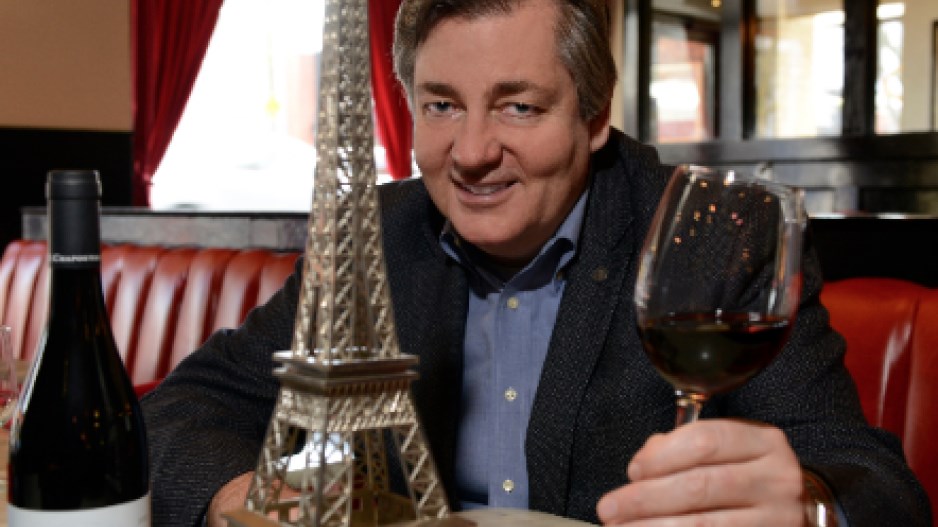The 36th annual Vancouver International Wine Festival (VIWF), which launches February 24, is expected to return to a growth curve for both revenue and profit.
That's a relief for organizers, who have grappled through an uncertain past couple years following the dissolution of the Vancouver Playhouse Theatre Co. (VPTC), which provided the festival with administrative support and was its charitable beneficiary.
The 54-event VIWF is expected this year to generate $1.7 million in revenue and about $250,000 in proceeds to new beneficiary Bard on the Beach Shakespeare Festival (BOTB), which does not provide administrative support to the festival.
That's more than 10% above last year for each of those metrics, festival director Harry Hertscheg told Business in Vancouver.
He added that the VIWF had to completely remake itself when a lack of operating capital forced its beneficiary, the debt-ridden VPTC, to dissolve in 2012.
Then 34 years old, the wine festival needed to find a new beneficiary for the approximately $400,000 in net proceeds that it generated each year or it would lose its status as a non-profit corporation and be unable to fulfill its purpose as a fund raiser, Hertscheg said.
Finding a new beneficiary was not difficult. After all, what arts organizations would not want annual cash donations?
Bigger challenges were grappling with new expenses for accounting, bookkeeping and sponsorship management – all functions that the former VPTC performed.
Those costs cut into proceeds, so VIWF last year could only provide about $225,000 to BOTB.
"We now have a track record for what our expenses are and can account for those new costs," Hertscheg said. "They have not increased this year."
Revenue is expected to rise this year because pricier wine is served at some festival events. That is partly because France is the festival's theme region this year and bubbly is its theme wine style.
The best attended events at the festival remain its main tastings at the Vancouver Convention Centre, where 177 wineries from 14 countries are expected to each pour about four wines each.
Organizers have added a new Saturday afternoon main tasting partly to attract an older demographic who no longer wish to attend evening events.
"Prices for the main tastings have gone down," Hertscheg said before revealing one of his tips for how to build a successful festival: pass savings onto customers whenever possible.
Last year, main tasting ticket prices were $95, including the harmonized sales tax (HST). Because the B.C. government eliminated that tax last April, the festival this year is able to charge $89 for the same tickets and generate the same revenue.
Another of Hertscheg's tips is to hold the event as close as possible to the same dates each year. For much of the festival's first few decades, its dates bounced around between February and April with about the only restriction being that it never took place during spring break. The last three years, the festival has been held in late February.
"People now get that the festival is at the end of February," Herscheg said.
His final lesson, however, is to be flexible with timing of events within the festival, particularly when conferences and other events arise that may steal attendees.
BMO Capital Markets is hosting a major mining conference in Florida the same week as VIWF's February 24 through March 2 run.
So, Hertscheg moved VIWF's biggest grossing event, its gala, to February 22, before the official start of the festival.
Mining executives have been huge supporters of VIWF's gala in past years, particularly during the heady days before the 2008 global financial crisis.
In February 2008, the wine festival's gala fetched $293,000 largely from business executives besting each other with auction bids.
Goldcorp chairman Ian Telfer tendered that year's auction's biggest bid: $46,000 for a magnum of 1982 Petrus that was valued at $17,500 and was donated by fellow mining mogul and philanthropist Frank Giustra.
Executives at Canaccord Capital Inc. (now Canaccord Genuity Group) were also active in the bidding.
Canaccord's CEO, Paul Reynolds, bid $37,500 for a 12-bottle case of 1982 Mouton Rothschild wine valued at $20,000 and the company's chair and founder, Peter Brown, bid $37,000 for a dinner for 10 at Whistler's Barefoot Bistro. He then donated that dinner back to the festival.




